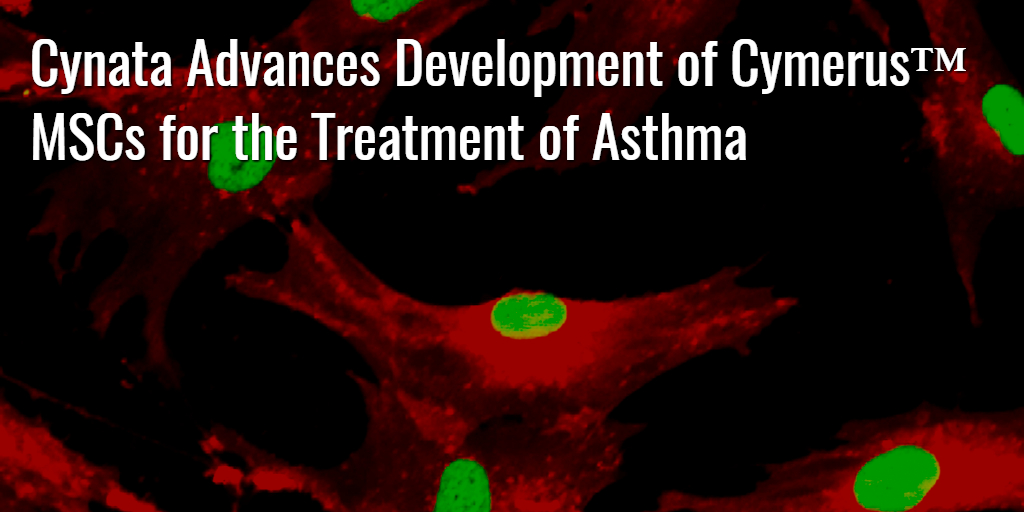- Final report of initial preclinical study confirms Cymerus™ MSCs have significant beneficial effects on all three key components of asthma: airway hyper-responsiveness, inflammation and airway remodelling
- Additional preclinical study expected to pave the way for a potential clinical trial
 Melbourne, Australia; 2 March 2017 – Australian stem cell and regenerative medicine company, Cynata Therapeutics Limited (ASX: CYP), has signed an agreement with the Monash Lung Biology Network, a consortia involving researchers from the Monash Biomedicine Discovery Institute and Department of Pharmacology at Monash University, Melbourne, to conduct a further preclinical study to support the use of CymerusTM mesenchymal stem cells (MSCs) for the treatment of asthma.
Melbourne, Australia; 2 March 2017 – Australian stem cell and regenerative medicine company, Cynata Therapeutics Limited (ASX: CYP), has signed an agreement with the Monash Lung Biology Network, a consortia involving researchers from the Monash Biomedicine Discovery Institute and Department of Pharmacology at Monash University, Melbourne, to conduct a further preclinical study to support the use of CymerusTM mesenchymal stem cells (MSCs) for the treatment of asthma.
Asthma is a chronic, long term lung condition recognised by the World Health Organisation as a disease of major public health importance due to its global prevalence. Patients who suffer from chronic asthma manage the disease through the use of steroid type drugs, which can have significant side effects and impact on patients’ quality of life. The global market for asthma drugs is expected to reach US$25.6 billion by 20241 so this challenging disease represents a highly valuable commercial opportunity for Cynata.
In October 2016, Cynata announced compelling initial data from a proof of concept study of Cymerus™ MSCs in an experimental model of asthma, which was conducted under the supervision of Associate Professor Chrishan Samuel and Dr Simon Royce at Monash University. Those initial results clearly demonstrated that Cymerus™ MSCs have a dramatic effect on improving airway hyper-responsiveness. Cynata recently received the final report of that study, which showed that Cymerus™ MSCs also consistently reduced markers of airway inflammation and airway remodelling. The preparation of a manuscript describing these findings is at an advanced stage, and it is expected to be submitted to a leading peer-reviewed journal in the near future.
Leading on from these findings, and consequent to the recent capital raising, the Company will now conduct a further study in collaboration with Associate Professor Samuel’s group, which will focus on the effects of Cymerus™ MSCs in combination with and in comparison to corticosteroids. This study has direct clinical relevance, as corticosteroids are the most widely used class of drugs currently used to control and/or prevent asthma exacerbations.
“Our findings so far are encouraging, in particular because Cymerus™ MSCs exerted effects that had not been seen with equivalent doses of human bone marrow-derived MSCs, or other stem cells, in the same model. We are therefore very pleased to be able to continue our collaboration with Cynata”, said Associate Professor Samuel.
“The final report of the initial study at Monash has strengthened our confidence that Cymerus™ MSCs could exert substantial disease-modifying effects (rather than just treating the symptoms) in asthma, which is a very exciting prospect, given the large number of people who are unable to gain control of their asthma using existing drugs,” said Cynata Vice President of Product Development, Dr Kilian Kelly.
“We are optimistic that this accelerated program will pave the way forward for a clinical trial in asthma patients in the near future”, added Dr Kelly.
About Cynata Therapeutics (ASX: CYP)
Cynata Therapeutics Limited (ASX: CYP) is an Australian stem cell and regenerative medicine company that is developing a therapeutic stem cell platform technology, Cymerus™, originating from the University of Wisconsin-Madison, a world leader in stem cell research. The proprietary Cymerus™ technology addresses a critical shortcoming in existing methods of production of mesenchymal stem cells (MSCs) for therapeutic use, which is the ability to achieve economic manufacture at commercial scale. Cymerus™ utilises induced pluripotent stem cells (iPSCs) to produce a particular type of MSC precursor, called a mesenchymoangioblast (MCA). The Cymerus™ platform provides a source of MSCs that is independent of donor limitations and provides an “off-the-shelf” stem cell platform for therapeutic product use, with a pharmaceutical product business model and economies of scale. This has the potential to create a new standard in the emergent arena of stem cell therapeutics and provides both a unique differentiator and an important competitive position.
Contacts
Dr Ross Macdonald, CEO: Tel: 0412 119343; email [email protected]
Rudi Michelson, Monsoon, Australia Media Contact, 0411 402 737, [email protected]
Footnotes
1. Grand View Research, Inc. Report, July 2016




















Tell Us What You Think!